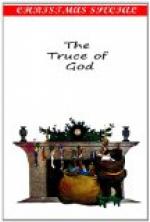So the Bishop went, muffled in a cloak, and mantled with displeasure. And with him, now that Clotilde had fled, went all that was good and open to the sun, from the grey castle of Charles the Fair.
At evening Joan came again, still afoot, but now clad in her best. She came alone, and the men at the gates, instructed, let her in. She gazed around the courtyard with its burden of grain that had been crushed out of her people below, with its loitering soldiers and cackling fowls, and she shivered as the gates closed behind her.
She was a good girl, as the times went, and she knew well that she had been brought up the hill as the stallion that morning had been driven down. She remembered the cut of the whip, and in the twilight of the courtyard she stretched out her arms toward the little town below, where the old man, her father, lived in semi-darkness, and where on that Christmas evening the women were gathered in the churches to pray.
* * * * *
Having no seasonable merriment in himself, Charles surrounded himself that night with cheer. A band of wandering minstrels had arrived to sing, the great fire blazed, the dogs around it gnawed the bones of the Christmas feast. But when the troubadours would have sung of the Nativity, he bade them in a great voice to have done. So they sang of war, and, remembering his cousin Philip, his eyes blazed.
When Joan came he motioned her to a seat beside him, not on his right, but on his left, and there he let her sit without speech. But his mind was working busily. He would have a son and the King would legitimise him. Then let Philip go hang. These lands of his as far as the eye could reach and as far again would never go to him.
The minstrels sang of war, and of his own great deeds, but there was no one of them with so beautiful a voice as that of the Fool, who could sing only of peace. And the Fool was missing.
However, their songs soothed his hurt pride. This was he; these things he had done. If the Bishop had not turned sour and gone, he would have heard what they sang. He might have understood, too, the craving of a man’s warrior soul for a warrior son, for one to hold what he had gathered at such cost. Back always to this burning hope of his!
Joan sat on his left hand, and went hot and cold, hot with shame and cold with fear.
So now, his own glory as a warrior commencing to pall on him, Charles would have more tribute, this time as lord of peace. He would celebrate this day of days, and at the same time throw a sop to Providence.
He would release the Jew.
The troubadours sang louder; fresh liquor was passed about. Charles waited for the Jew to be brought.
He remembered Clotilde then. She should see him do this noble thing. Since her mother had gone she had shrunk from him. Now let her see how magnanimous he could be. He, the seigneur, who held life and death in his hands, would this day give, not death, but life.




